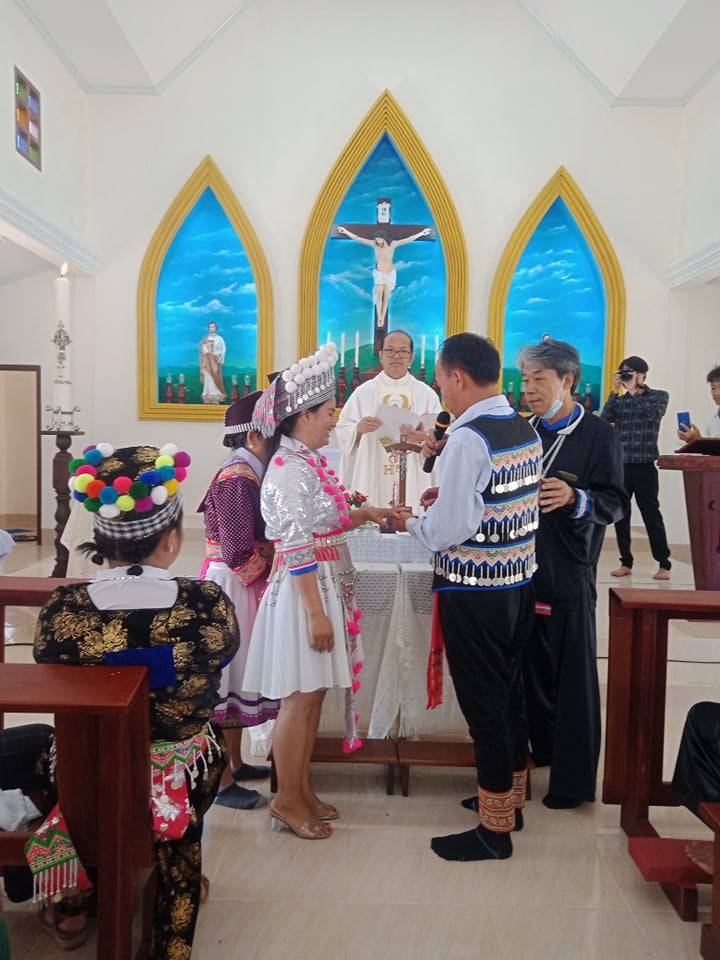Joaquim Magalhães de Castro
Apostolic Vicariate of Pakse, Laos
One of the most remote and mysterious outskirts of the Catholic Church in the world, Laos saw the first missionaries arrive, sporadically, it is true, already in the distant 16th century, and the Dominican Gaspar da Cruz was probably one of the first Europeans to visit such latitudes. The seed of Christianity would take time to germinate, but the missionary practice of going to villages and visiting Catholic families, or talking about Jesus to those who don’t know him, with joy in the heart, would remain alive, as this is a peculiar characteristic of being a Christian in those parts.
“In Laos,” says the Apostolic Vicar of Pakse, Bishop Andrew Souksavath Nouane Asa, “we do not know how to do otherwise. Our life is missionary every day and in all circumstances. Simple, with few resources, but with the great joy of being like this. In this sense, I can say that we are in deep harmony and put into practice the words that Pope Francis gave us in his apostolic exhortation Evangelii Gaudium”.
Bishop Asa, 50 years old, spoke about his missionary experience in an interview given to the Vatican news agency at the end of October, “Mission month”, highlighting the persistent isolation of the Catholic community in Laos, which has only recently changed thanks to a new policy of openness to the outside world. It should be recalled here that, in 1976, all the missionaries were expelled and the churches closed by order of the Laotian regime, which, to this day, has not yet established diplomatic relations with the Vatican, only an apostolic delegation based in Thailand.
Fortunately, in December 2019, the Lao government reversed the situation by passing a law that guarantees the rights of Christians to practice their faith without being disturbed, after decades of persecution. However, this law has been little publicized and is practically not applied in the interior of the country where Christians continue to face discrimination from some provincial officials.
The story of Dom Andrew Souksavath Nouane Asa’s vocation, in a country that has 51 thousand Catholics, among 7.3 million inhabitants, divided into four apostolic vicariates (Vientiane, Pakse, Luang Prabang, Savannakhet), “has a universal value and paradigmatic” for all Catholic communities. Andrew was born in 1972 in Pakse, “near the bishop’s house”, into a deeply Catholic family. His grandfather had always taken care of the French priests of the Paris Foreign Missions (MEP), “preparing food for them and helping them with pastoral service”; his parents having followed in those footsteps. “We attended Mass every Sunday and then talked about the Word of God,” recalls the prelate.
Officially, Christian evangelization is attributed to the MEP priests, responsible for the construction of a chapel in Vientiane, in 1896, and the establishment of the Apostolic Vicariate, in 1899, but the truth is that, in the middle of the 17th century, the Jesuit Giovanni Maria Leria, within the scope of the Portuguese Padroado do Oriente strategy, had tried to establish a mission in Laos to open a “missionary road” east of Tonkin, far from the Chinese coast and the Japanese archipelago, where “a succession of political, religious and military forces created serious problems for the Society of Jesus at the beginning of the 17th century”, forcing it to rethink its installation strategies in Southeast Asia.
Established in the shadow of the Tonkin mission, which benefited from the economic support of the Japanese diaspora in Indochina (formed partly by Christians), the Laos mission suffered from the kingdom’s isolation, bad relations with Siam and also from the war involving its two neighbors on the Peninsula, “the Trinh in the North and the Nguyên in the South”. To protect the mission, the Jesuits promised the king of Laos to open relations with Macau, with the expectation that they would supply the kingdom with weapons and goods. However, despite all Jesuit efforts, the Lao mission declined and was closed in 1650.
Dom Andrew Souksavath Nouane Asa’s studies began at the Minor Seminary, “when he was just 16 years old”, and continued, “with the help of a Government scholarship”, at university. The French missionary Pierre Antonio Jean Bach (MEP), former Apostolic Vicar of Savannakhet, would help him leave for Canada, where Andrew would complete his “studies towards the priesthood”.
In Vancouver, he studied philosophy and theology, with financial support from the local Catholic community. He later returned to his country to exercise the priesthood, in Kamphaeng, “the village where my family was born”, in the parish of St. Joseph, where 300 Catholic families live. Missionaries, nuns and faithful were present at the celebration: “It was a great celebration, a great gift from God”, recalls the Apostolic Vicar of Pakse.
In 2006, there were only three priests in the Vicariate and the number of Catholics was equal to 17,000 people. Andrew had 10 mission stations under his control, some of them difficult to access, in the mountains or in the forests. “In some places there were 20 Catholic families, in others 50. I was always on the move,” he recalls. Today the work has not changed: the Vicariate of Pakse encompasses 64 mission stations, sometimes mere wooden chapels, where indigenous families “gather to pray and listen to the Word of God, often led by a catechist”.
Fortunately, year after year the Lao government has granted more freedom of action. “Today we can move freely and we only need special authorizations for large gatherings of people; there are no obstacles in the daily service,” concludes the Apostolic Vicar of Pakse.


 Follow
Follow


